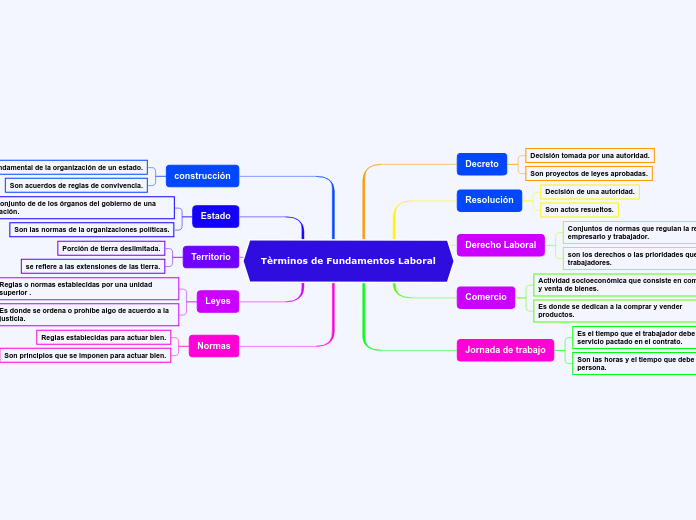par Anyineth Arosemena Il y a 4 années
275
Tèrminos de Fundamentos Laboral

par Anyineth Arosemena Il y a 4 années
275

Plus de détails
A conjunction is a word like 'if' 'but' or 'and' which is used to connect sentences or clauses together.
Subordinating conjunctions are conjunctions that are used at the beginning of subordinate clauses. Some examples of these conjunctions are: although, after, before, because, how, if, once, since, so that, until, unless, when etc.
Coordinating conjunctions always connect phrases, words, and clauses. They are: for, and, nor, but, or, yet, so.
A preposition is one of the most exciting parts of grammar. A preposition is used to describe the location of something in relation to something else.
An interjection is used to express emotion in a sentence.
Think of other interjections!
An adverb is used to describe a verb, but it can also describe an adjective or another adverb.
Adverbs normally help paint a fuller picture by describing how something happens.
The intensifiers strengthen adverbs adjectives and adverbs and down- toners make them weaker.
A numeral is a word or phrase that describes a numerical quantity.
Some theories of grammar use the word 'numeral' to refer to cardinal numbers that act as a determiner to specify the quantity of a noun, for example the 'two' in 'two hats'.
An article is a word used to modify a noun, which is a person, place, object, or idea. Technically, an article is an adjective, which is any word that modifies a noun.
Indefinite articles are the words 'a' and 'an.' Each of these articles is used to refer to a noun, but the noun being referred to is not a specific person, place, object, or idea. It can be any noun from a group of nouns.
It refers directly to a specific noun or groups of nouns.
A pronoun is a word that can be used in place of a noun, typically after the noun itself has already been stated.
Demonstrative pronouns are used to demonstrate (or indicate). This, that, these, and those are all demonstrative pronouns.
A noun is defined as a person, place, thing or idea. Proper nouns always begin with a capital letter. Common nouns, which are general words, such as 'cars,' are not capitalized.
Compound nouns are words where two nouns have been stuck together to make a new noun. Compound nouns should be written as one word, without a hyphen.
A noun which refers to a group of things/people.
A verb is an action word or 'doing' word that signifies movement in some way.
An auxiliary verb helps the main (full) verb and is also called a 'helping verb.' With auxiliary verbs, you can write sentences in different tenses, moods, or voices.
A participle is a verb form that can be used as an adjective or to create a verb tense. There are two types of participles: Present participle (ending -ing) and Past participle (usually ending -ed, -d, -t, -en, or -n).